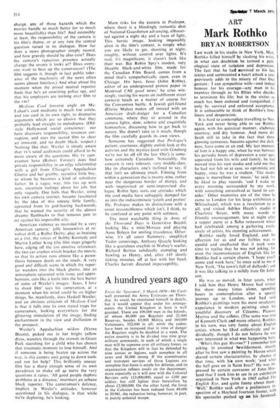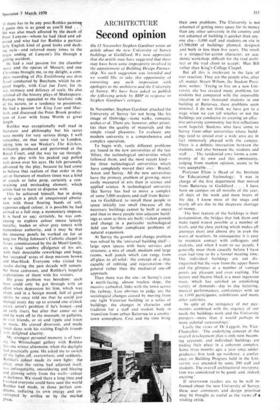ART
Mark Rothko BRYAN ROBERTSON
Last week in his studio in New York, Mark Rothko killed himself by slashing his wrists in what can doubtless be termed a path.
ological state of isolation and depression.
The fact that he had survived to his late sixties and surmounted a heart attack a year previously adds to the misery of that final gesture: I can sympathise with—and indeed honour for his courage—any man in his twenties through to his fifties who decides to terminate his life; but in the sixties so much has been endured and vanquished, if only by survival and enforced acceptance. It is unbearable to think of Rothko's lone- liness and desperation.
It is hard to contemplate travelling to New York and never being able to see Rothko again, with his quizzical manner, elaborate courtesy, and dry humour. And more dif- ficult still to take in the fact that those glowing canvasses, beacons against the dark- ness, have come to an end. My last memory of him is a happy one, when he was between his periodic bouts of depression a year ago; separated from his wife and family, he had moved into his vast studio and told me that he had not felt so at ease, so optimistic and happy, since he was a student. 'The studio space is marvellous for music,' he said, for he liked to play records, 'and I wake up every morning surrounded by my work. with something unresolved at hand to con- sider.' Other memories are of the time he came to London for his large exhibition at Whitechapel, which was a revelation to us all, and visited Adrian Heath's studio in Charlotte Street, with many words of friendly encouragement, late at night after a supper party at a Soho restaurant which had celebrated, among a gathering exclu- sively of artists, his stunning achievement.
Rothko really loved England, and his affection for us and our foibles was so candid and unaffected that it took some time to realise that he was not joking, for even the inconveniences of English life for Rothko had a certain charm. 'I hope you'll come and work here,' he once said to me in New York, 'The town's full of dullards'; and it was like talking to a mildly irate Dr John- son.
He was so moved, in-later years, when I told him that Henry Moore had visited his show many times alone, spending hours in contemplation after a special journey up to London, and had said Rothko's paintings were his most revelatory experience in modern painting since his youthful discovery of Cdzanne, Picasso. Matisse and the cubists. (The same was true of Kenneth Clark and many others). Rothko. in his turn, was very funny about English artists, whom he liked collectively and in- dividually, though I do not believe he was very interested in what was happening here.
'Who's this guy Heeron?' I remember him asking. in assumed bewilderment, shortly after he first saw a painting by Heron which shared certain characteristics, by chance at that time, with his own work; 'and what the hell goes on in Saint Ives?' He was im- pressed by certain canvasses of John Hoy- land that I took him to see in an exhibition organised in New York in 1965 called The English Eye, and quite funny about them: 'Well.' Rothko said, after a preliminary In- spection of a Hoyland fourteen footer, with I his spectacles pushed tala on his forehead, • if there has to be any post-Rothko painting I guess this is as good as you'll find . . He was also much affected by the death of Peter Lanyon—whom he had liked and ad- mired and who had for Rothko a particui lady English kind of good looks and dash- ing style—and referred many times to the tragic ending of Lanyon's life through a gliding accident. He had a real passion for the chamber music and the operas of Mozart; and one Christmas brought me, to my delight, a com- plete recording of Die End iihrung aus dem .Serail conducted by Beecham, which he en- joyed hugely, with Cosi fan Tutti, for its wit, intimacy and delicacy of scale. He also relished all the history plays of Shakespeare. Perhaps they appealed to the fatalistic side of his nature, or a tendency to pessimism. He had a passion for King Lear and Mac- beth, and discussed the Peter Brook produc- tion of Lear with Irene Worth at great length.
Rothko was exceptionally well read in literature and philosophy but his tastes were mostly for very serious things. I well remember, on that same visit to London, taking him to see Wesker's The Kitchen, brilliantly produced and performed at the Royal Court, and the way he sat through- out the play with his peaked cap pulled well down over his eyes. He felt personally affronted by the play, because he had come to believe that realism of that order in the art or literature of modern times was a kind of crutch or false prop, certainly a con- straining and misleading element, which artists had to learn to dispense with.
This he achieved himself, but in doing so to such a pitch of unequivocal absolu- tion, with those floating bands of soft, vaporous-edged colour, it is possible he had arrived at a full stop, a momentary impasse. It is hard to say; certainly, he was con- tinuing to explore colour (more latterly metallic, leaden or silver grey tones) with tremendous authority, and it may be that the immense panels he worked on for so long for Philip Johnson's Catholic chapel in Texas, commissioned by the de Menil family, are a final sombre effulgence of his art, with their detectable reworkings and huge, but 'occupied' areas of deep maroon brown and blue-black. Everyone who visited his studio during the past decade will remem- ber those canvasses, and Rothko's hopeful explorations of therrr-with his visitors.
His great problem was boredom: each hour could only be got through with an effort when depression hit him, which was often; and in a benign mood, full of good spirits, he once told me that he could just manage every day up to around one o'clock revery artist's problem if he's honest—and an early riser), but after that ennui set in and he went off to the museum. to galleries, to visit friends, or sit and tipple and listen to music. He craved diversion, and made lunch dates with his visiting English friends with delighted alacrity.
My strongest personal memory is of leav- ing the Whitechapel gallery with Rothko late one winter afternoon, when the daylight had practically gone. He asked me to switch all the lights off, everywhere; and suddenly, Rothko's colour made its own light: the effect, once the retina had adjusted itself, was unforgettable, smouldering and blazing and glowing softly from the walls—colour in darkness. We stood there a long time and I wished everyone could have seen the world Rothko had made, in those perfect con- ditions, radiating its own energy and un- corrupted by artifice or by the market place,



































 Previous page
Previous page